人教版新目标八年级下册Unit 1What's the matter? Section A (1a-2d)-课件(共30张PPT)
文档属性
| 名称 | 人教版新目标八年级下册Unit 1What's the matter? Section A (1a-2d)-课件(共30张PPT) | 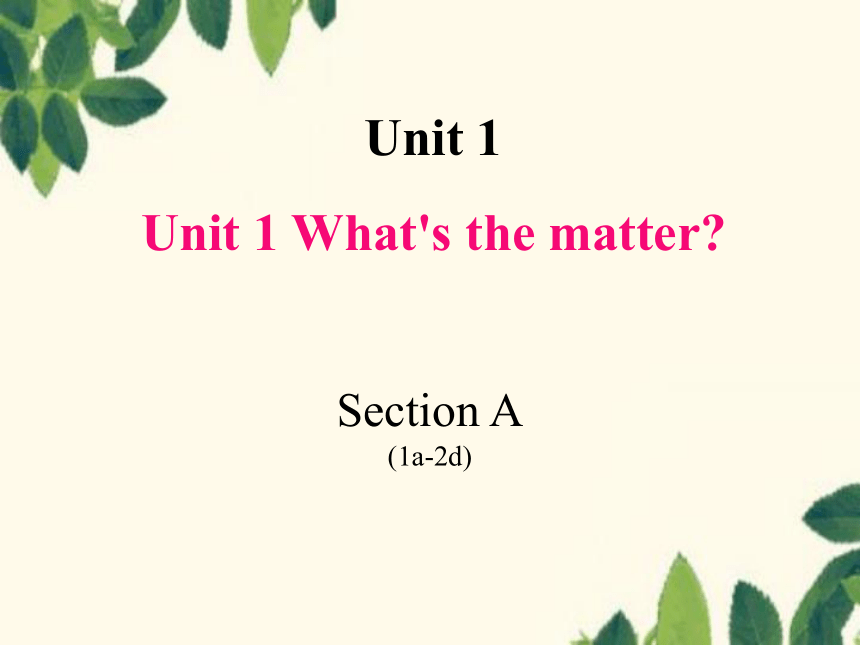 | |
| 格式 | pptx | ||
| 文件大小 | 1.0MB | ||
| 资源类型 | 教案 | ||
| 版本资源 | 人教新目标(Go for it)版 | ||
| 科目 | 英语 | ||
| 更新时间 | 2022-05-29 17:17:49 | ||
图片预览

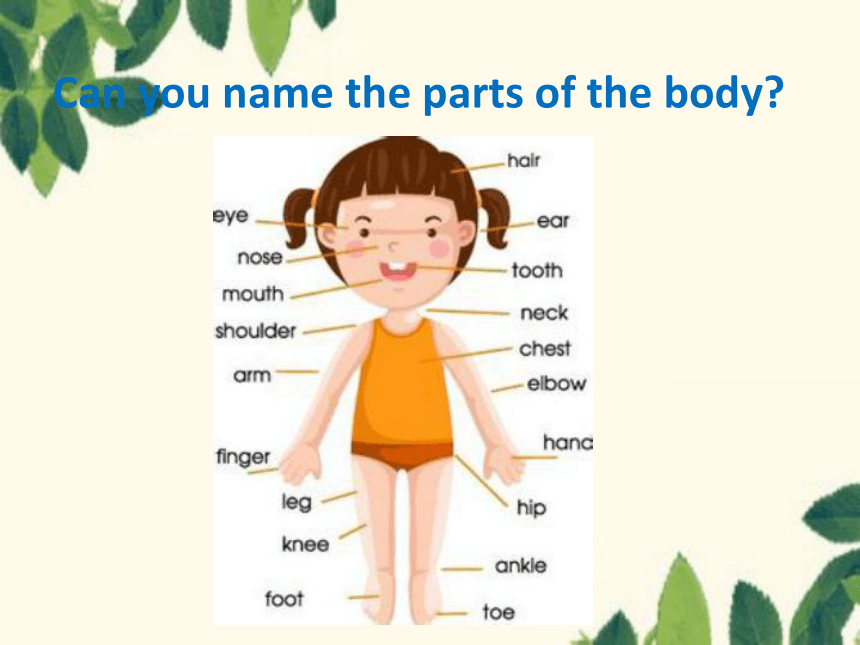
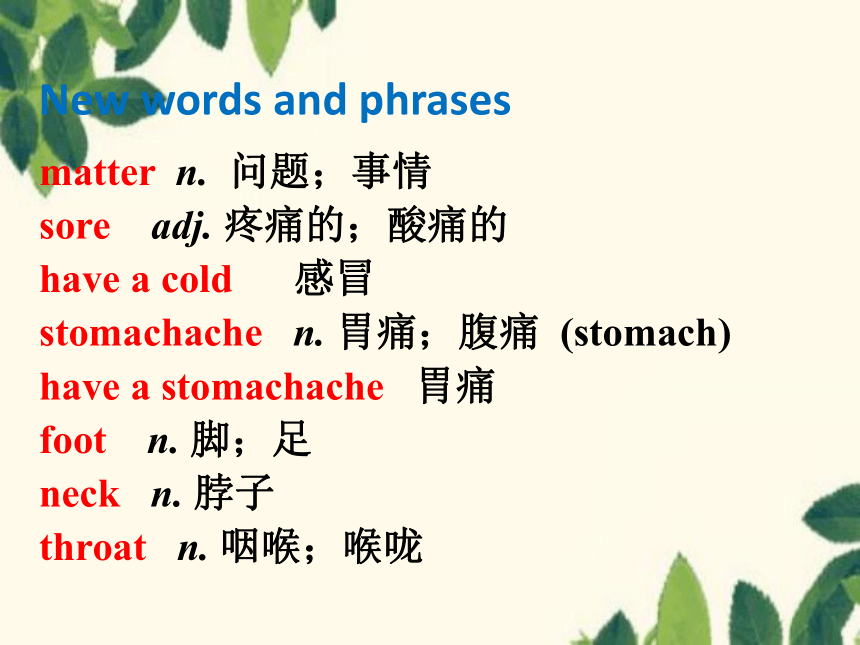
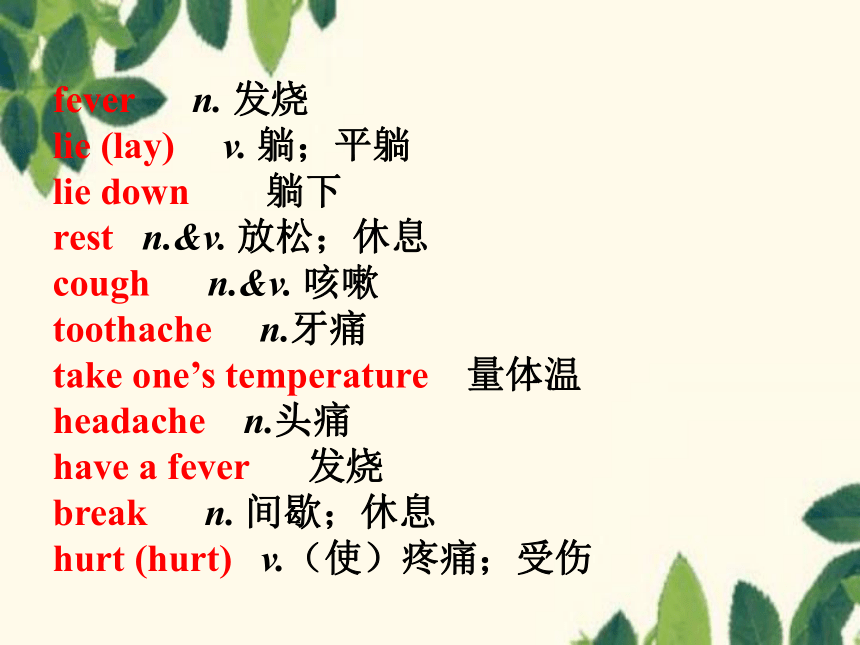
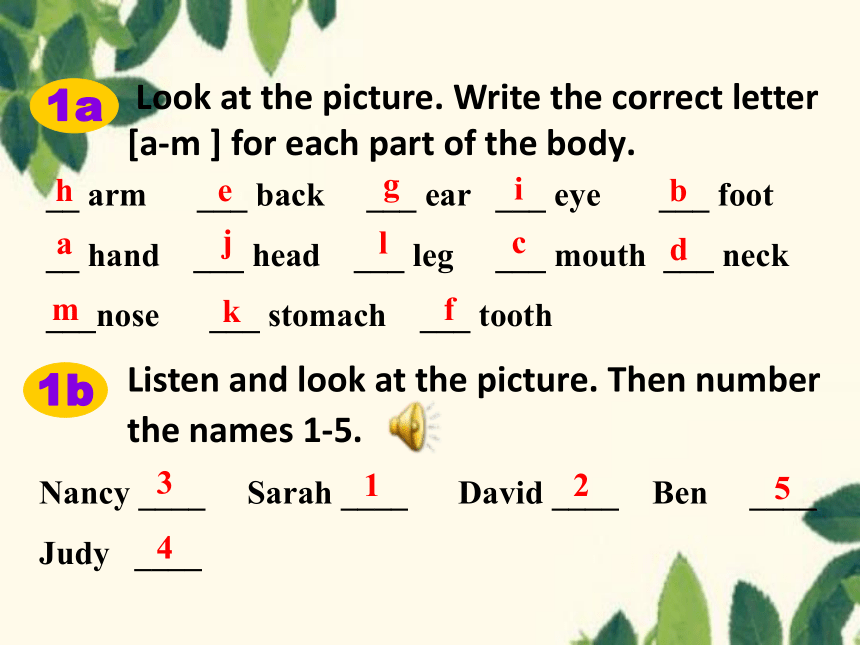
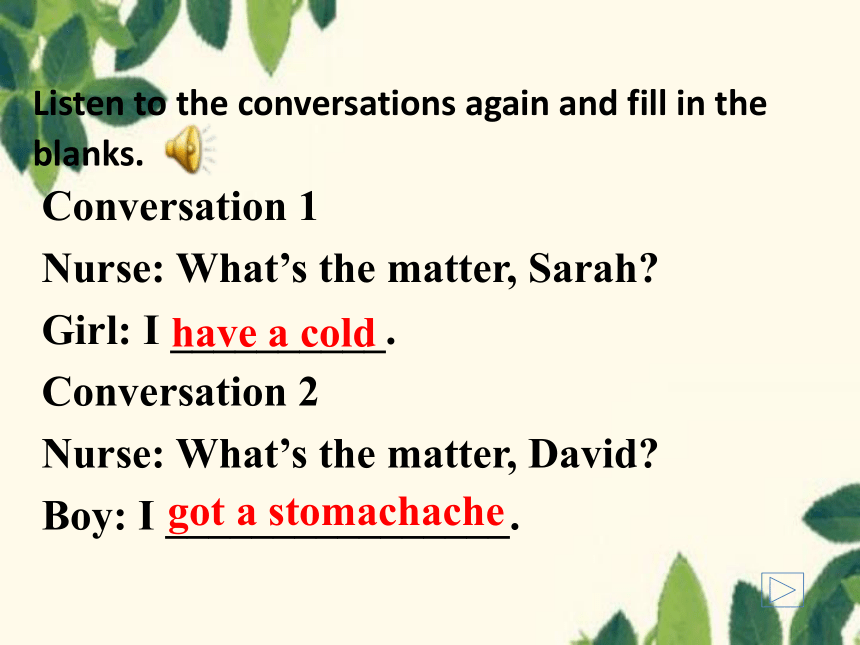
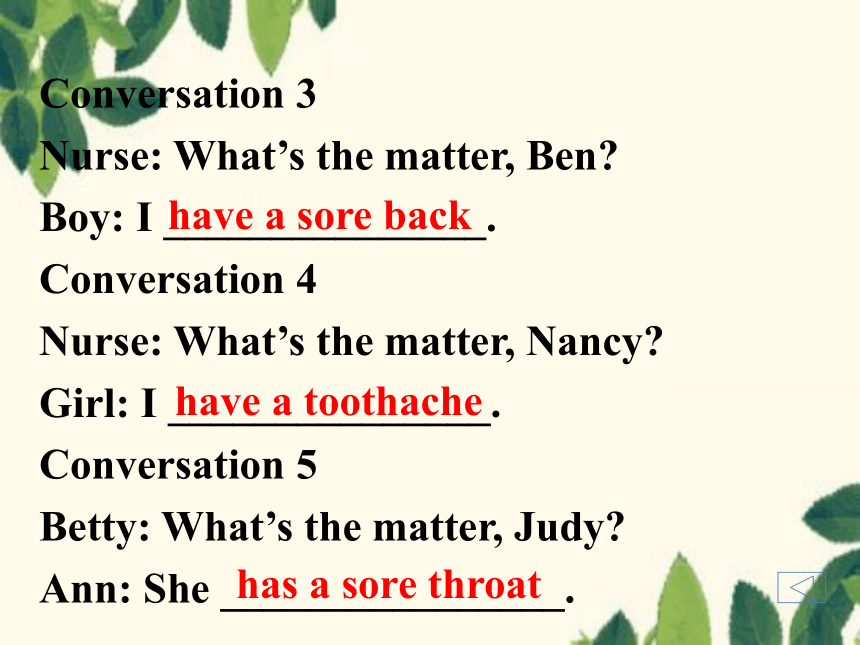
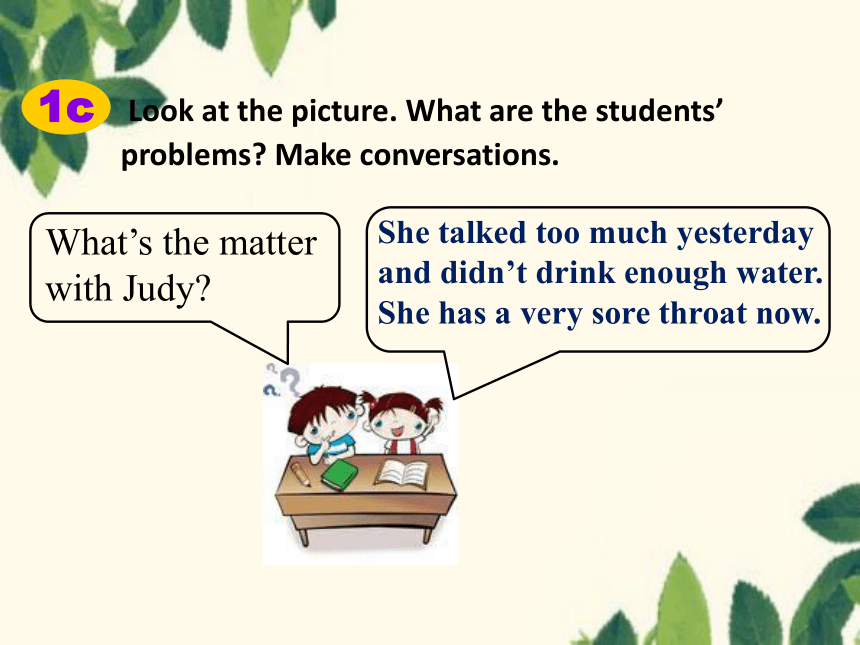
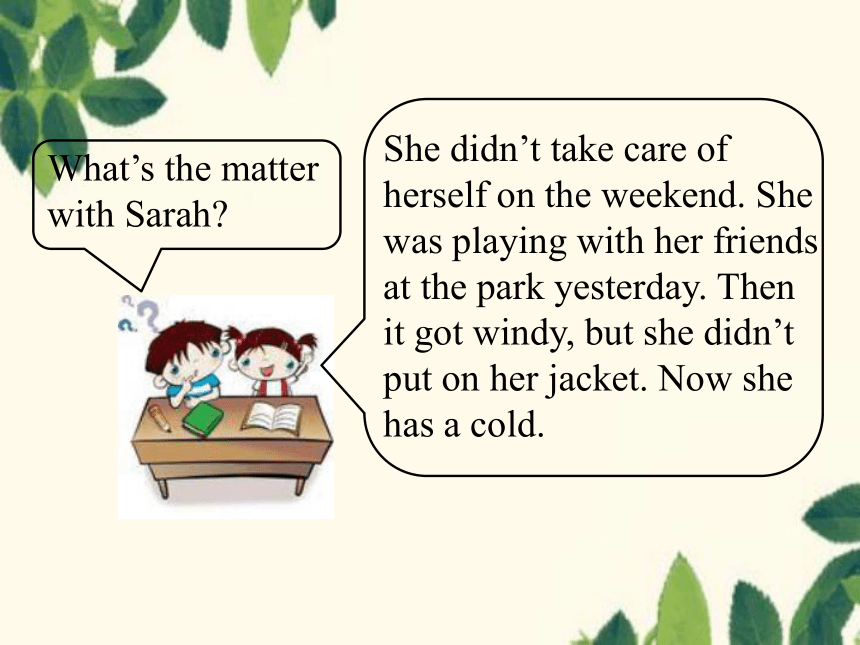
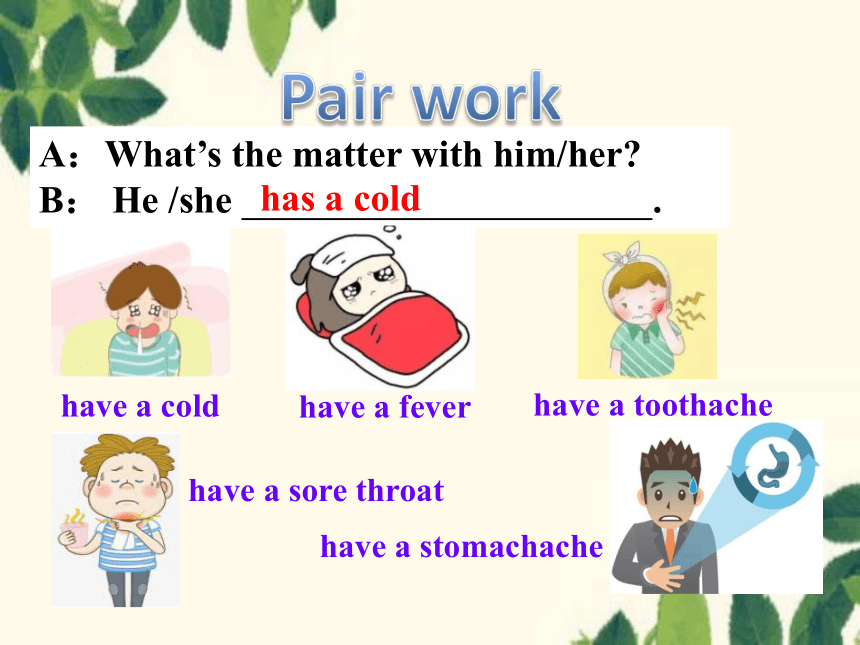
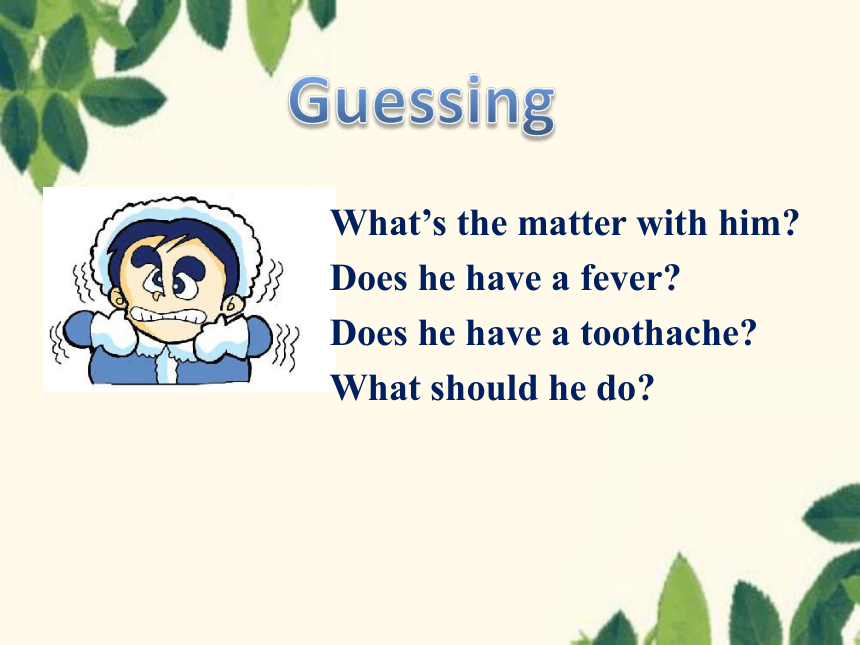
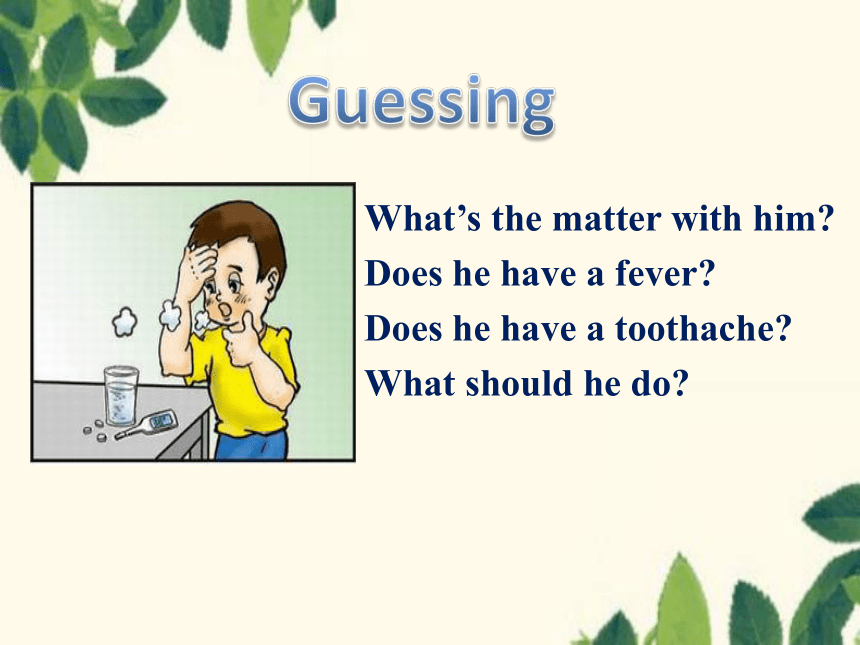
文档简介
(共30张PPT)
Unit 1
Unit 1 What's the matter
Section A
(1a-2d)
Can you name the parts of the body
matter n. 问题;事情
sore adj. 疼痛的;酸痛的
have a cold 感冒
stomachache n. 胃痛;腹痛 (stomach)
have a stomachache 胃痛
foot n. 脚;足
neck n. 脖子
throat n. 咽喉;喉咙
New words and phrases
fever n. 发烧
lie (lay) v. 躺;平躺
lie down 躺下
rest n.&v. 放松;休息
cough n.&v. 咳嗽
toothache n.牙痛
take one’s temperature 量体温
headache n.头痛
have a fever 发烧
break n. 间歇;休息
hurt (hurt) v.(使)疼痛;受伤
__ arm ___ back ___ ear ___ eye ___ foot
__ hand ___ head ___ leg ___ mouth ___ neck ___nose ___ stomach ___ tooth
h
e
g
i
b
a
j
l
c
d
m
k
f
1a
Look at the picture. Write the correct letter [a-m ] for each part of the body.
1b
Listen and look at the picture. Then number the names 1-5.
Nancy ____ Sarah ____ David ____ Ben ____ Judy ____
3
1
2
5
4
Conversation 1
Nurse: What’s the matter, Sarah
Girl: I __________.
Conversation 2
Nurse: What’s the matter, David
Boy: I ________________.
have a cold
got a stomachache
Listen to the conversations again and fill in the blanks.
Conversation 3
Nurse: What’s the matter, Ben
Boy: I _______________.
Conversation 4
Nurse: What’s the matter, Nancy
Girl: I _______________.
Conversation 5
Betty: What’s the matter, Judy
Ann: She ________________.
have a sore back
have a toothache
has a sore throat
1c
Look at the picture. What are the students’ problems Make conversations.
She talked too much yesterday and didn’t drink enough water. She has a very sore throat now.
What’s the matter with Judy
What’s the matter with Sarah
She didn’t take care of herself on the weekend. She was playing with her friends at the park yesterday. Then it got windy, but she didn’t put on her jacket. Now she has a cold.
A:What’s the matter with him/her
B: He /she .
have a cold
have a fever
have a toothache
have a sore throat
have a stomachache
has a cold
Pair work
What’s the matter with him
Does he have a fever
Does he have a toothache
What should he do
Guessing
What’s the matter with him
Does he have a fever
Does he have a toothache
What should he do
Guessing
What’s the matter with him
Does he have a fever
Does he have a toothache
Does he have a sore throat
Does he have a stomachache
What should he do
Guessing
1
2
3
5
4
2a
Listen and number the pictures [1-5] in the order you hear them.
1 fever
a lie down and rest
2 stomachache
b drink some hot tea with
honey
3 cough and sore
throat
c see a dentist and get an
X-ray
4 toothache
d take your temperature
5 cut myself
e put some medicine on it
2b
Listen again. Match the problems with the advice.
A: What’s the matter
B: My head feels very hot.
A: Maybe you have a fever.
B: What should I do
A: You should take your temperature.
2c
Make conversations using the information in 2a and 2b.
Imagine you are the school doctor. A few students have health problems. Role-play a conversation between the doctor and the students.
Role-play
Mandy: Lisa, are you OK
Lisa: I have a headache and I can’t move my
neck. What should I do Should I take
my temperature
Mandy: No, it doesn’t sound like you have a
fever. What did you do on the
weekend
Lisa: I played computer games all weekend.
2d
Role-play the conversation.
Mandy: That’s probably why. You need to take breaks away from the computer.
Lisa: Yeah, I think I sat in the same way for too
long without moving.
Mandy: I think you should lie down and rest. If your head and neck still hurt tomorrow, then go to a doctor.
Lisa: OK. Thanks, Mandy.
Answer the questions.
1. What’s the matter with Lisa
2. Did she have a fever
3. What did she do the night before
She has a headache and can’t move her neck.
No, she didn’t.
She played computer games all weekend.
4. What does she need to do
5. What should she do for now
6. What should she do if things don’t get
better
She needs to take breaks away from the computer.
She should lie down and rest.
She should go to a doctor.
Language points
①
What’s the matter 怎么了 (教材P1)
“What’s the matter ”意为“怎么了?”,常用于询问对方有什么不顺心的事、身体哪里不舒服或某物有什么问题,后面可接with sb./sth.,表示“某人/某物怎么了”。
You look very sad. What’s the matter 你看上去很难过。怎么了?
What’s the matter with the old man 那位老先生怎么了?
【拓展】用来询问疾病、不适或突发情况时,还可用以下句型:
What’s the trouble (with ...)
What happened (to ...)
Is there anything wrong (with ...)
【联想】 “What’s wrong/the trouble (with sb./sth.) ”意为“(某人/某物)出什么事了?”,可与“What’s the matter (with sb./sth.) ”进行同义句转换。
What’s the matter / What’s wrong/ What’s the trouble with the boy 那个男孩怎么了?
②I have a cold.我感冒了。(教材P1)
have a cold意为“感冒”。
【联想】表示“疾病”的常见短语:
My brother had a bad cold.我的哥哥患了重感冒。
③ I have a stomachache.我胃痛。(教材P1)
stomachache名词,意为“胃痛;腹痛”,是一个复合名词。其常用搭配为have a stomachache“胃痛”。
Mary has a stomachache.玛丽胃痛。
④ I have a sore back.我背疼。(教材P1)
back此处作名词,意为“背;背部”。
Keep your back straight.挺直背。
【拓展】
back作名词,还可意为“后面;背面”;还
可作动词,意为“回来;回原处”。
The mother kissed her son on the back of his head.那位母亲在儿子的后脑勺上亲了一下。
I want to go back home.我想回家。
根据括号内的要求完成下列各题。
(1)—_____________________________
_____________________________
—My son has a cough.(写出问句)
(2)—What happened to him
—He ___________(切着自己) cutting the tomatoes.
(根据汉语提示补全答语)
cut himself
即学即练
What’s the matter / What’s wrong
with your son
根据上下文内容填空。
即学即练
Mandy: Lisa, are you OK
Lisa: I ____ a headache and I can’t move my neck. What ______ I do Should I ____ my temperature
Mandy: No, it doesn’t sound like you have a fever. What ___ you do on the weekend
Lisa: I played computer ______ all weekend.
have
should
take
did
games
Mandy: That’s probably why. You need to take
breaks_____ from the computer.
Lisa: Yeah, I think I sat in the _____ way for too long
without moving.
Mandy: I think you should ____ down and rest. If your
head and neck still hurt tomorrow, then go to a
_______.
Lisa: OK. Thanks, Mandy.
away
same
lie
doctor
即学即练
1. 你怎么了?我头痛。
2. 他怎么了?他发烧。
What is the matter with you
I have a headache.
What’s the matter with him
He has a fever.
翻译下列句子。
即学即练
3. 李雷怎么了?他喉咙痛。他应该多喝水。
4. 如果你的头和脖子明天仍然疼的话,请去看医生。
What’s the matter with Li Lei
He has a sore throat.
He should drink lots of water.
If your head and neck still hurt tomorrow, then go to a doctor.
即学即练
Unit 1
Unit 1 What's the matter
Section A
(1a-2d)
Can you name the parts of the body
matter n. 问题;事情
sore adj. 疼痛的;酸痛的
have a cold 感冒
stomachache n. 胃痛;腹痛 (stomach)
have a stomachache 胃痛
foot n. 脚;足
neck n. 脖子
throat n. 咽喉;喉咙
New words and phrases
fever n. 发烧
lie (lay) v. 躺;平躺
lie down 躺下
rest n.&v. 放松;休息
cough n.&v. 咳嗽
toothache n.牙痛
take one’s temperature 量体温
headache n.头痛
have a fever 发烧
break n. 间歇;休息
hurt (hurt) v.(使)疼痛;受伤
__ arm ___ back ___ ear ___ eye ___ foot
__ hand ___ head ___ leg ___ mouth ___ neck ___nose ___ stomach ___ tooth
h
e
g
i
b
a
j
l
c
d
m
k
f
1a
Look at the picture. Write the correct letter [a-m ] for each part of the body.
1b
Listen and look at the picture. Then number the names 1-5.
Nancy ____ Sarah ____ David ____ Ben ____ Judy ____
3
1
2
5
4
Conversation 1
Nurse: What’s the matter, Sarah
Girl: I __________.
Conversation 2
Nurse: What’s the matter, David
Boy: I ________________.
have a cold
got a stomachache
Listen to the conversations again and fill in the blanks.
Conversation 3
Nurse: What’s the matter, Ben
Boy: I _______________.
Conversation 4
Nurse: What’s the matter, Nancy
Girl: I _______________.
Conversation 5
Betty: What’s the matter, Judy
Ann: She ________________.
have a sore back
have a toothache
has a sore throat
1c
Look at the picture. What are the students’ problems Make conversations.
She talked too much yesterday and didn’t drink enough water. She has a very sore throat now.
What’s the matter with Judy
What’s the matter with Sarah
She didn’t take care of herself on the weekend. She was playing with her friends at the park yesterday. Then it got windy, but she didn’t put on her jacket. Now she has a cold.
A:What’s the matter with him/her
B: He /she .
have a cold
have a fever
have a toothache
have a sore throat
have a stomachache
has a cold
Pair work
What’s the matter with him
Does he have a fever
Does he have a toothache
What should he do
Guessing
What’s the matter with him
Does he have a fever
Does he have a toothache
What should he do
Guessing
What’s the matter with him
Does he have a fever
Does he have a toothache
Does he have a sore throat
Does he have a stomachache
What should he do
Guessing
1
2
3
5
4
2a
Listen and number the pictures [1-5] in the order you hear them.
1 fever
a lie down and rest
2 stomachache
b drink some hot tea with
honey
3 cough and sore
throat
c see a dentist and get an
X-ray
4 toothache
d take your temperature
5 cut myself
e put some medicine on it
2b
Listen again. Match the problems with the advice.
A: What’s the matter
B: My head feels very hot.
A: Maybe you have a fever.
B: What should I do
A: You should take your temperature.
2c
Make conversations using the information in 2a and 2b.
Imagine you are the school doctor. A few students have health problems. Role-play a conversation between the doctor and the students.
Role-play
Mandy: Lisa, are you OK
Lisa: I have a headache and I can’t move my
neck. What should I do Should I take
my temperature
Mandy: No, it doesn’t sound like you have a
fever. What did you do on the
weekend
Lisa: I played computer games all weekend.
2d
Role-play the conversation.
Mandy: That’s probably why. You need to take breaks away from the computer.
Lisa: Yeah, I think I sat in the same way for too
long without moving.
Mandy: I think you should lie down and rest. If your head and neck still hurt tomorrow, then go to a doctor.
Lisa: OK. Thanks, Mandy.
Answer the questions.
1. What’s the matter with Lisa
2. Did she have a fever
3. What did she do the night before
She has a headache and can’t move her neck.
No, she didn’t.
She played computer games all weekend.
4. What does she need to do
5. What should she do for now
6. What should she do if things don’t get
better
She needs to take breaks away from the computer.
She should lie down and rest.
She should go to a doctor.
Language points
①
What’s the matter 怎么了 (教材P1)
“What’s the matter ”意为“怎么了?”,常用于询问对方有什么不顺心的事、身体哪里不舒服或某物有什么问题,后面可接with sb./sth.,表示“某人/某物怎么了”。
You look very sad. What’s the matter 你看上去很难过。怎么了?
What’s the matter with the old man 那位老先生怎么了?
【拓展】用来询问疾病、不适或突发情况时,还可用以下句型:
What’s the trouble (with ...)
What happened (to ...)
Is there anything wrong (with ...)
【联想】 “What’s wrong/the trouble (with sb./sth.) ”意为“(某人/某物)出什么事了?”,可与“What’s the matter (with sb./sth.) ”进行同义句转换。
What’s the matter / What’s wrong/ What’s the trouble with the boy 那个男孩怎么了?
②I have a cold.我感冒了。(教材P1)
have a cold意为“感冒”。
【联想】表示“疾病”的常见短语:
My brother had a bad cold.我的哥哥患了重感冒。
③ I have a stomachache.我胃痛。(教材P1)
stomachache名词,意为“胃痛;腹痛”,是一个复合名词。其常用搭配为have a stomachache“胃痛”。
Mary has a stomachache.玛丽胃痛。
④ I have a sore back.我背疼。(教材P1)
back此处作名词,意为“背;背部”。
Keep your back straight.挺直背。
【拓展】
back作名词,还可意为“后面;背面”;还
可作动词,意为“回来;回原处”。
The mother kissed her son on the back of his head.那位母亲在儿子的后脑勺上亲了一下。
I want to go back home.我想回家。
根据括号内的要求完成下列各题。
(1)—_____________________________
_____________________________
—My son has a cough.(写出问句)
(2)—What happened to him
—He ___________(切着自己) cutting the tomatoes.
(根据汉语提示补全答语)
cut himself
即学即练
What’s the matter / What’s wrong
with your son
根据上下文内容填空。
即学即练
Mandy: Lisa, are you OK
Lisa: I ____ a headache and I can’t move my neck. What ______ I do Should I ____ my temperature
Mandy: No, it doesn’t sound like you have a fever. What ___ you do on the weekend
Lisa: I played computer ______ all weekend.
have
should
take
did
games
Mandy: That’s probably why. You need to take
breaks_____ from the computer.
Lisa: Yeah, I think I sat in the _____ way for too long
without moving.
Mandy: I think you should ____ down and rest. If your
head and neck still hurt tomorrow, then go to a
_______.
Lisa: OK. Thanks, Mandy.
away
same
lie
doctor
即学即练
1. 你怎么了?我头痛。
2. 他怎么了?他发烧。
What is the matter with you
I have a headache.
What’s the matter with him
He has a fever.
翻译下列句子。
即学即练
3. 李雷怎么了?他喉咙痛。他应该多喝水。
4. 如果你的头和脖子明天仍然疼的话,请去看医生。
What’s the matter with Li Lei
He has a sore throat.
He should drink lots of water.
If your head and neck still hurt tomorrow, then go to a doctor.
即学即练
同课章节目录
- Unit 1 What's the matter?
- Section A
- Section B
- Unit 2 I'll help to clean up the city parks.
- Section A
- Section B
- Unit 3 Could you please clean your room?
- Section A
- Section B
- Unit 4 Why don't you talk to your parents?
- Section A
- Section B
- Unit 5 What were you doing when the rainstorm came
- Section A
- Section B
- Review of Units 1-5
- Unit 6 An old man tried to move the mountains.
- Section A
- Section B
- Unit 7 What's the highest mountain in the world?
- Section A
- Section B
- Unit 8 Have you read Treasure Island yet?
- Section A
- Section B
- Unit 9 Have you ever been to a museum?
- Section A
- Section B
- Unit 10 I've had this bike for three years.
- Section A
- Section B
